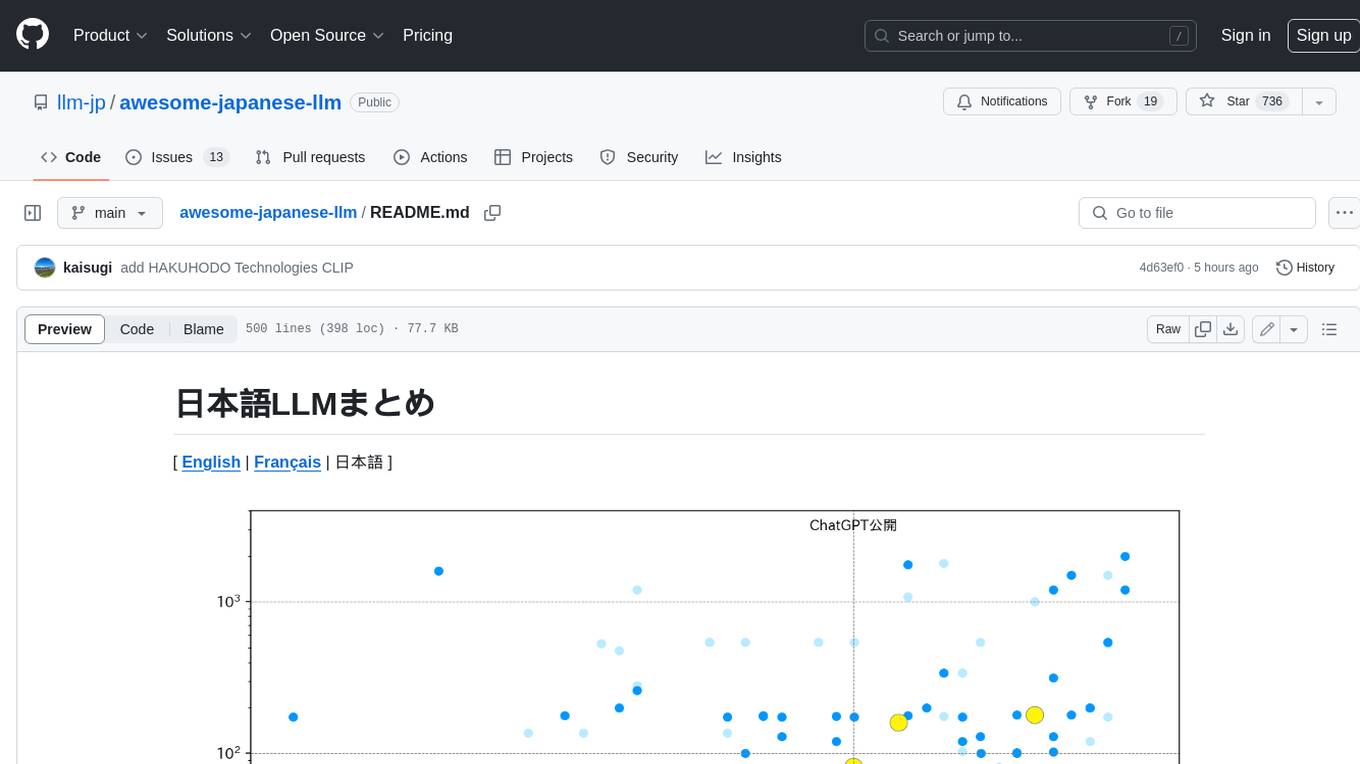
casibase
⚡️AI Cloud OS: Open-source enterprise-level AI knowledge base and MCP (model-context-protocol)/A2A (agent-to-agent) management platform with admin UI, user management and Single-Sign-On⚡️, supports ChatGPT, Claude, Llama, Ollama, HuggingFace, etc., chat bot demo: https://ai.casibase.com, admin UI demo: https://ai-admin.casibase.com
Stars: 4055
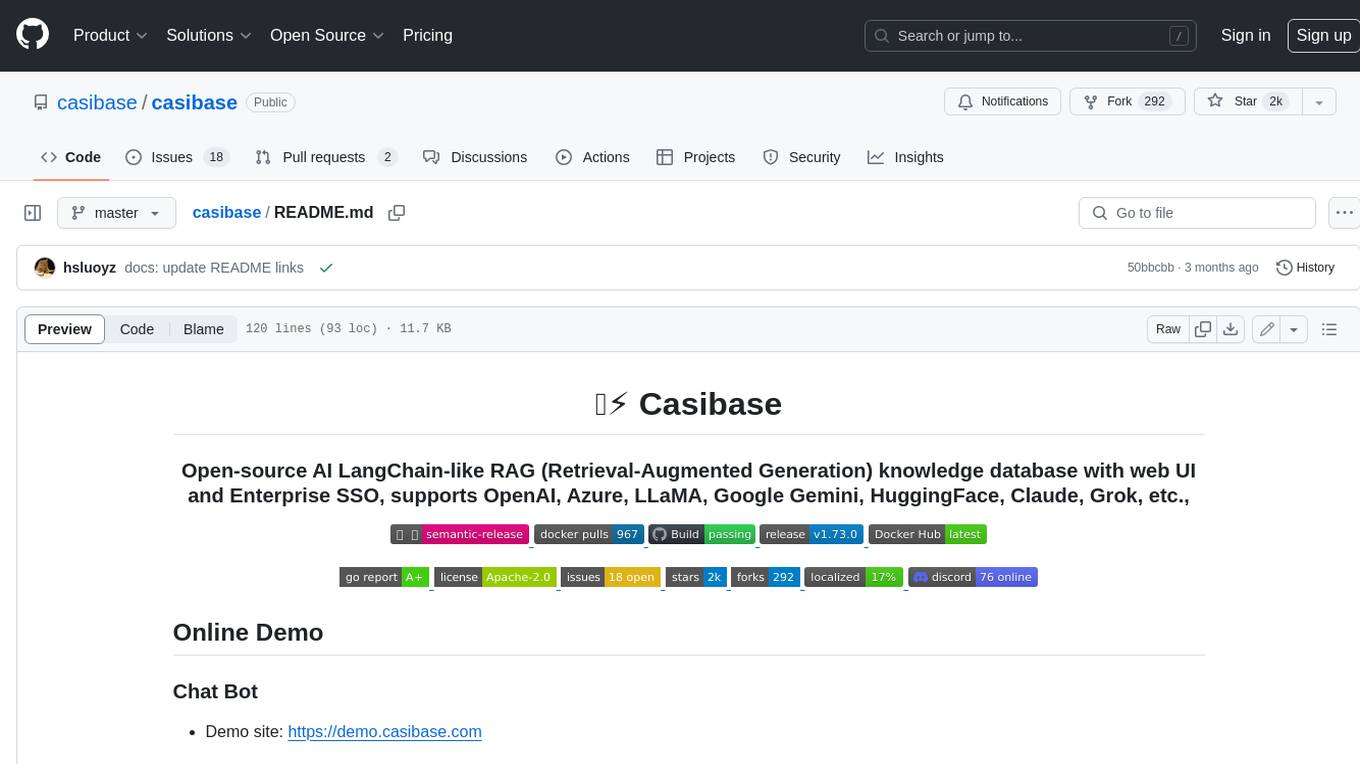
Casibase is an open-source AI LangChain-like RAG (Retrieval-Augmented Generation) knowledge database with web UI and Enterprise SSO, supports OpenAI, Azure, LLaMA, Google Gemini, HuggingFace, Claude, Grok, etc.
README:
AI Cloud OS: Open-source enterprise-level AI knowledge base and MCP (model-context-protocol)/A2A (agent-to-agent) management platform with admin UI, user management and Single-Sign-On⚡️, supports ChatGPT, Claude, Llama, Ollama, HuggingFace, etc.
- Chat bot: https://ai.casibase.com
- Admin UI: https://ai-admin.casibase.com
- Chat bot: https://demo.casibase.com
- Admin UI: https://demo-admin.casibase.com
Casibase contains 2 parts:
| Name | Description | Language |
|---|---|---|
| Frontend | User interface for Casibase | JavaScript + React |
| Backend | Server-side logic and API for Casibase | Golang + Beego + Python + Flask + MySQL |
Language Model
| Model | Sub Type | Link |
|---|---|---|
| OpenAI | dall-e-3, gpt-3.5-turbo-0125, gpt-3.5-turbo, gpt-3.5-turbo-1106, gpt-3.5-turbo-instruct, gpt-3.5-turbo-16k-0613, gpt-3.5-turbo-16k, gpt-4-0125-preview, gpt-4-1106-preview, gpt-4-turbo-preview, gpt-4-vision-preview, gpt-4-1106-vision-preview, gpt-4, gpt-4-0613, gpt-4-32k, gpt-4-32k-0613, gpt-4o, gpt-4o-2024-05-13, gpt-4o-mini, gpt-4o-mini-2024-07-18 | OpenAI |
| Claude | claude-2.0, claude-2.1, claude-instant-1.2, claude-3-sonnet-20240229, claude-3-opus-20240229, claude-3-haiku-20240307 | Claude |
| Local | custom-model | Local Computer |
| DeepSeek | deepseek-chat, deepseek-reasoner | DeepSeek |
| Azure | dall-e-3, gpt-3.5-turbo-0125, gpt-3.5-turbo, gpt-3.5-turbo-1106, gpt-3.5-turbo-instruct, gpt-3.5-turbo-16k-0613, gpt-3.5-turbo-16k, gpt-4-0125-preview, gpt-4-1106-preview, gpt-4-turbo-preview, gpt-4-vision-preview, gpt-4-1106-vision-preview, gpt-4, gpt-4-0613, gpt-4-32k, gpt-4-32k-0613, gpt-4o, gpt-4o-2024-05-13, gpt-4o-mini, gpt-4o-mini-2024-07-18 | Azure |
| Amazon Bedrock | claude, claude-instant, command, command-light, embed-english, embed-multilingual, jurassic-2-mid, jurassic-2-ultra, llama-2-chat-13b, llama-2-chat-70b, titan-text-lite, titan-text-express, titan-embeddings, titan-multimodal-embeddings | Amazon Bedrock |
| Qwen | qwen-long, qwen-turbo, qwen-plus, qwen-max, qwen-max-longcontext | Qwen |
| Gemini | gemini-pro, gemini-pro-vision | Gemini |
| Hugging Face | meta-llama/Llama-2-7b, tiiuae/falcon-180B, bigscience/bloom, gpt2, baichuan-inc/Baichuan2-13B-Chat, THUDM/chatglm2-6b | Hugging Face |
| Cohere | command-light, command | Cohere |
| iFlytek | spark-v1.5, spark-v2.0 | iFlytek |
| ChatGLM | glm-3-turbo, glm-4, glm-4V | ChatGLM |
| MiniMax | abab5-chat | MiniMax |
| Ernie | ERNIE-Bot, ERNIE-Bot-turbo, BLOOMZ-7B, Llama-2 | Ernie |
| Moonshot | moonshot-v1-8k, moonshot-v1-32k, moonshot-v1-128k | Moonshot |
| Baichuan | Baichuan2-Turbo, Baichuan3-Turbo, Baichuan4 | Baichuan |
| Doubao | Doubao-lite-4k, Doubao-lite-32k, Doubao-lite-128k, Doubao-pro-4k, Doubao-pro-32k, Doubao-pro-128k | Doubao |
| StepFun | step-1-8k, step-1-32k, step-1-128k, sstep-1-256k, step-1-flash, step-2-16k | StepFun |
| Hunyuan | hunyuan-lite, hunyuan-standard, hunyuan-standard-256K, hunyuan-pro, hunyuan-code, hunyuan-role, hunyuan-turbo | Hunyuan |
| Mistral | mistral-large-latest, pixtral-large-latest, mistral-small-latest, codestral-latest, ministral-8b-latest, ministral-3b-latest, pixtral-12b, mistral-nemo, open-mistral-7b, open-mixtral-8x7b, open-mixtral-8x22b | Mistral |
| OpenRouter | google/palm-2-codechat-bison, google/palm-2-chat-bison, openai/gpt-3.5-turbo, openai/gpt-3.5-turbo-16k, openai/gpt-4, openai/gpt-4-32k, anthropic/claude-2, anthropic/claude-instant-v1, meta-llama/llama-2-13b-chat, meta-llama/llama-2-70b-chat, palm-2-codechat-bison, palm-2-chat-bison, gpt-3.5-turbo, gpt-3.5-turbo-16k, gpt-4, gpt-4-32k, claude-2, claude-instant-v1, llama-2-13b-chat, llama-2-70b-chat | OpenRouter |
Embedding Model
| Model | Sub Type | Link |
|---|---|---|
| OpenAI | text-embedding-ada-002, text-embedding-3-small, text-embedding-3-large | OpenAI |
| Local | custom-embedding | Local Computer |
| Azure | text-embedding-ada-002, text-embedding-3-small, text-embedding-3-large | Azure |
| Hugging Face | sentence-transformers/all-MiniLM-L6-v2 | Hugging Face |
| Qwen | text-embedding-v1, text-embedding-v2, text-embedding-v3 | Qwen |
| Cohere | embed-english-v2.0, embed-english-light-v2.0, embed-multilingual-v2.0, embed-english-v3.0 | Cohere |
| Ernie | default | Ernie |
| MiniMax | embo-01 | MiniMax |
| Hunyuan | hunyuan-embedding | Hunyuan |
| Jina | jina-embeddings-v2-base-zh, jina-embeddings-v2-base-en, jina-embeddings-v2-base-de, jina-embeddings-v2-base-code | Jina |
https://casibase.org/docs/basic/server-installation
Discord: https://discord.gg/5rPsrAzK7S
For Casibase, if you have any questions, you can give issues, or you can also directly start Pull Requests(but we recommend giving issues first to communicate with the community).
For Tasks:
Click tags to check more tools for each tasksFor Jobs:
Alternative AI tools for casibase
Similar Open Source Tools

casibase
Casibase is an open-source AI LangChain-like RAG (Retrieval-Augmented Generation) knowledge database with web UI and Enterprise SSO, supports OpenAI, Azure, LLaMA, Google Gemini, HuggingFace, Claude, Grok, etc.
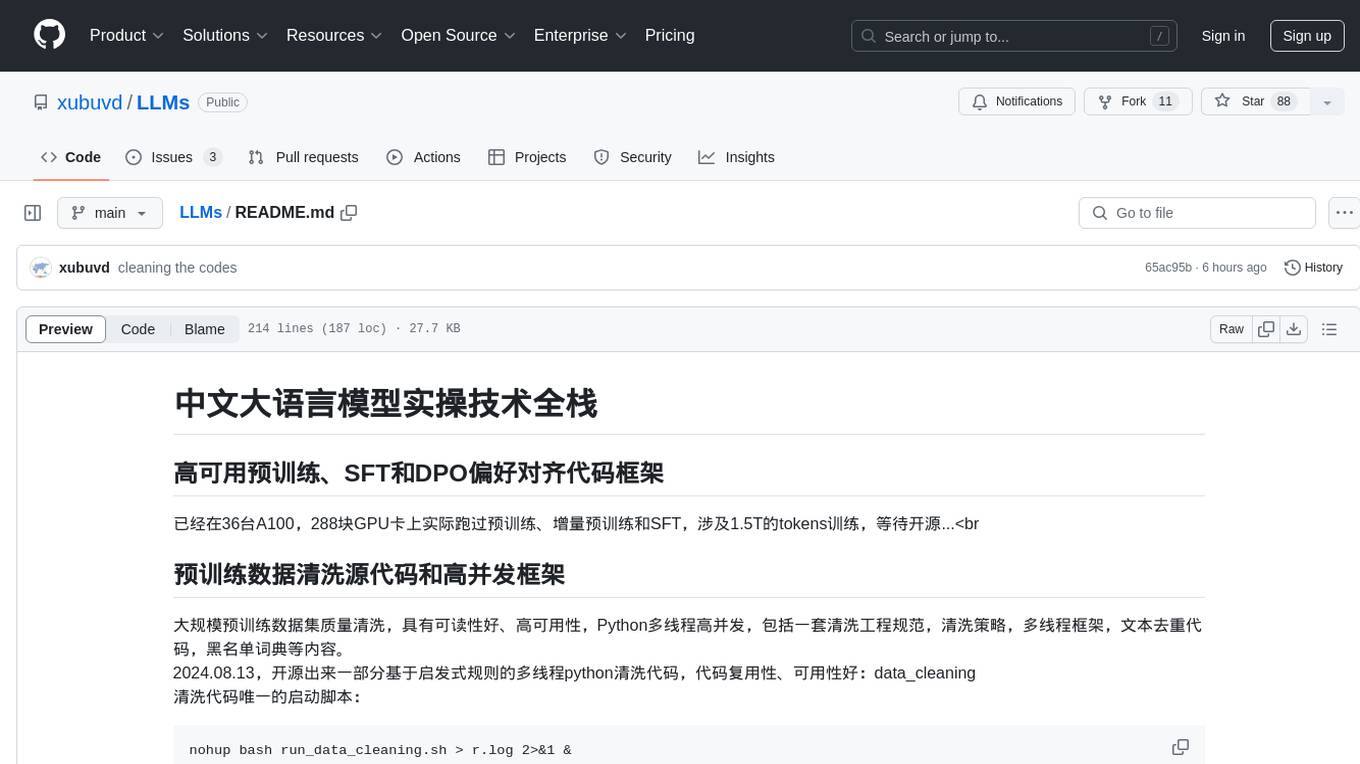
LLMs
LLMs is a Chinese large language model technology stack for practical use. It includes high-availability pre-training, SFT, and DPO preference alignment code framework. The repository covers pre-training data cleaning, high-concurrency framework, SFT dataset cleaning, data quality improvement, and security alignment work for Chinese large language models. It also provides open-source SFT dataset construction, pre-training from scratch, and various tools and frameworks for data cleaning, quality optimization, and task alignment.
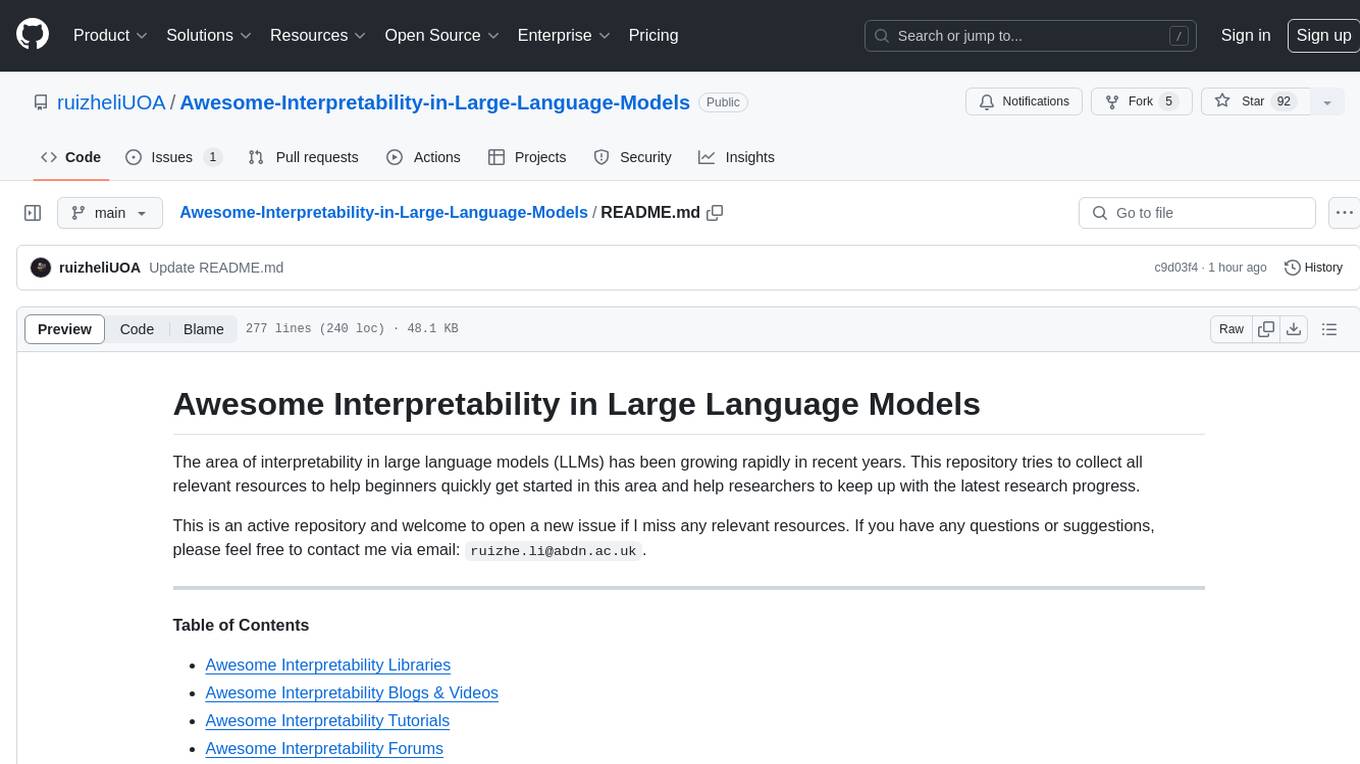
Awesome-Interpretability-in-Large-Language-Models
This repository is a collection of resources focused on interpretability in large language models (LLMs). It aims to help beginners get started in the area and keep researchers updated on the latest progress. It includes libraries, blogs, tutorials, forums, tools, programs, papers, and more related to interpretability in LLMs.
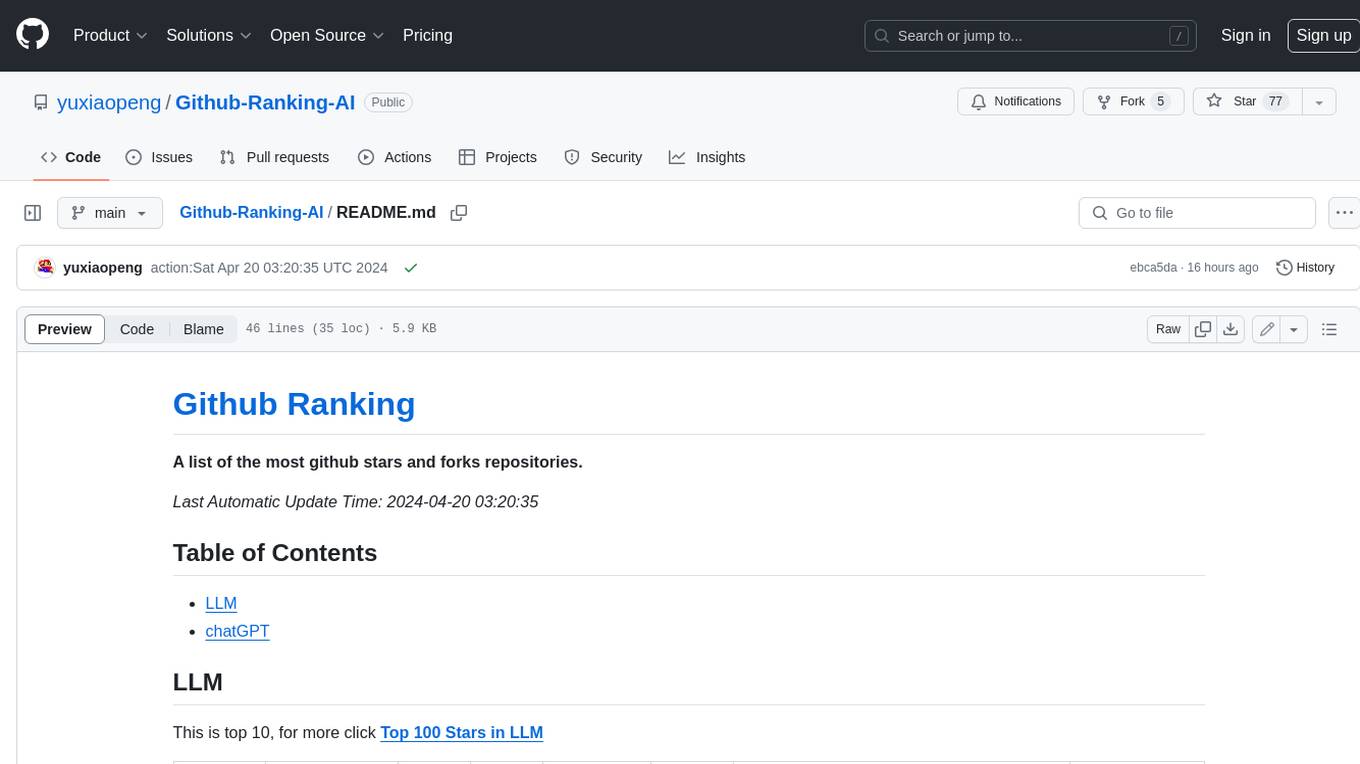
Github-Ranking-AI
This repository provides a list of the most starred and forked repositories on GitHub. It is updated automatically and includes information such as the project name, number of stars, number of forks, language, number of open issues, description, and last commit date. The repository is divided into two sections: LLM and chatGPT. The LLM section includes repositories related to large language models, while the chatGPT section includes repositories related to the chatGPT chatbot.
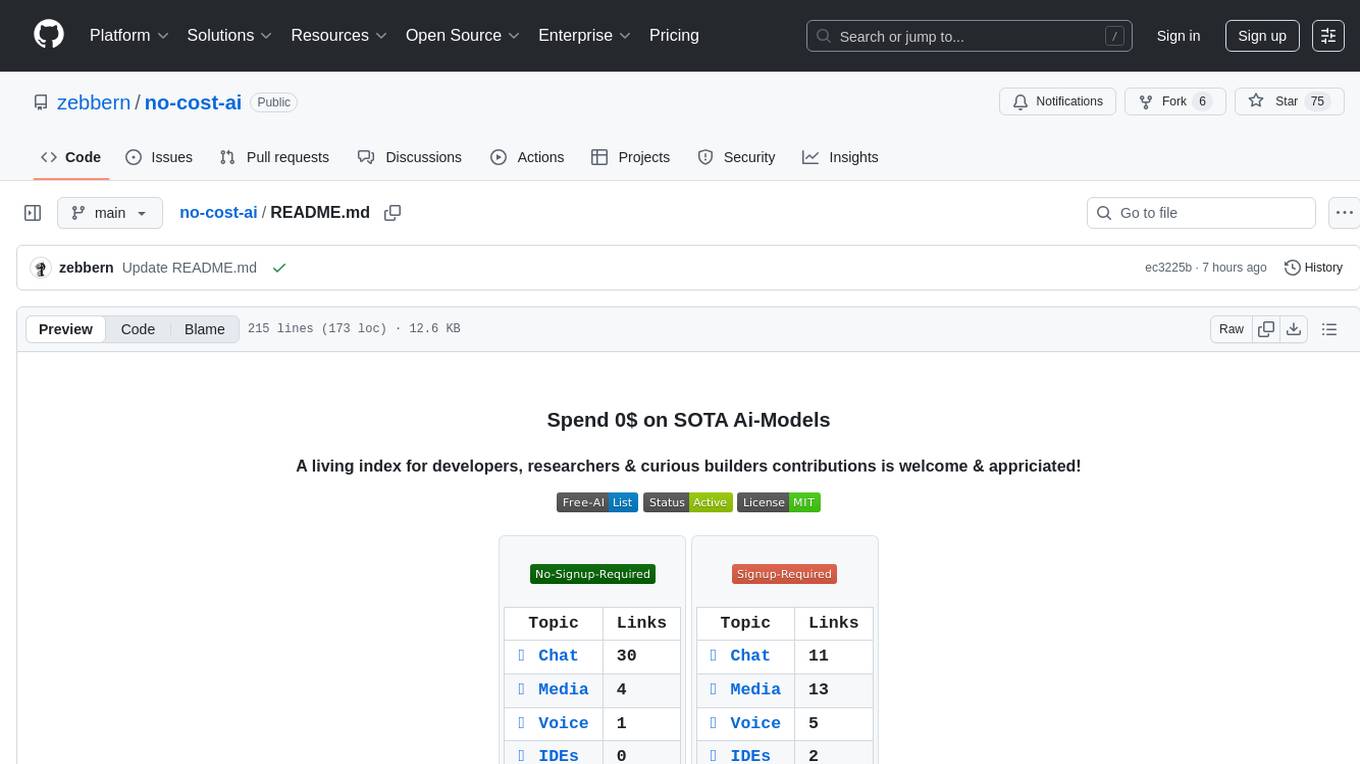
no-cost-ai
No-cost-ai is a repository dedicated to providing a comprehensive list of free AI models and tools for developers, researchers, and curious builders. It serves as a living index for accessing state-of-the-art AI models without any cost. The repository includes information on various AI applications such as chat interfaces, media generation, voice and music tools, AI IDEs, and developer APIs and platforms. Users can find links to free models, their limits, and usage instructions. Contributions to the repository are welcome, and users are advised to use the listed services at their own risk due to potential changes in models, limitations, and reliability of free services.
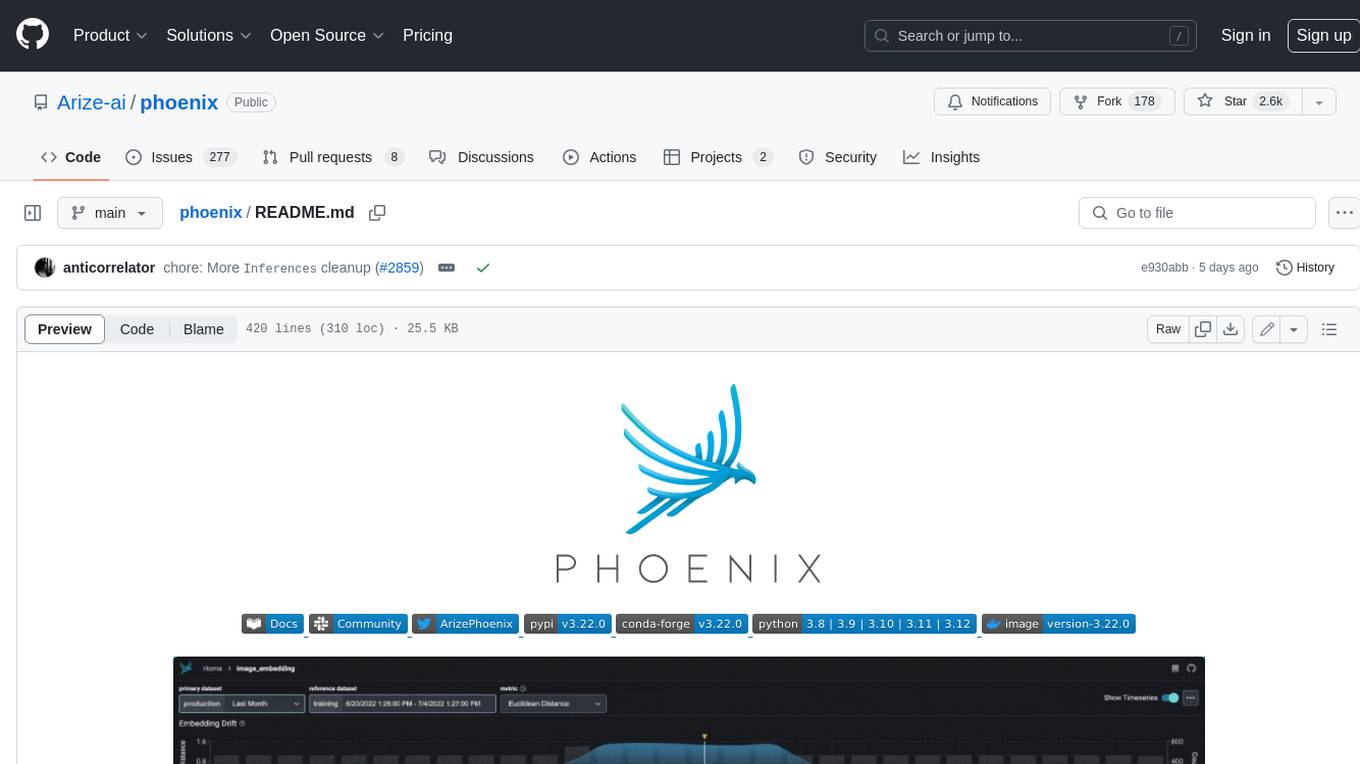
phoenix
Phoenix is a tool that provides MLOps and LLMOps insights at lightning speed with zero-config observability. It offers a notebook-first experience for monitoring models and LLM Applications by providing LLM Traces, LLM Evals, Embedding Analysis, RAG Analysis, and Structured Data Analysis. Users can trace through the execution of LLM Applications, evaluate generative models, explore embedding point-clouds, visualize generative application's search and retrieval process, and statistically analyze structured data. Phoenix is designed to help users troubleshoot problems related to retrieval, tool execution, relevance, toxicity, drift, and performance degradation.
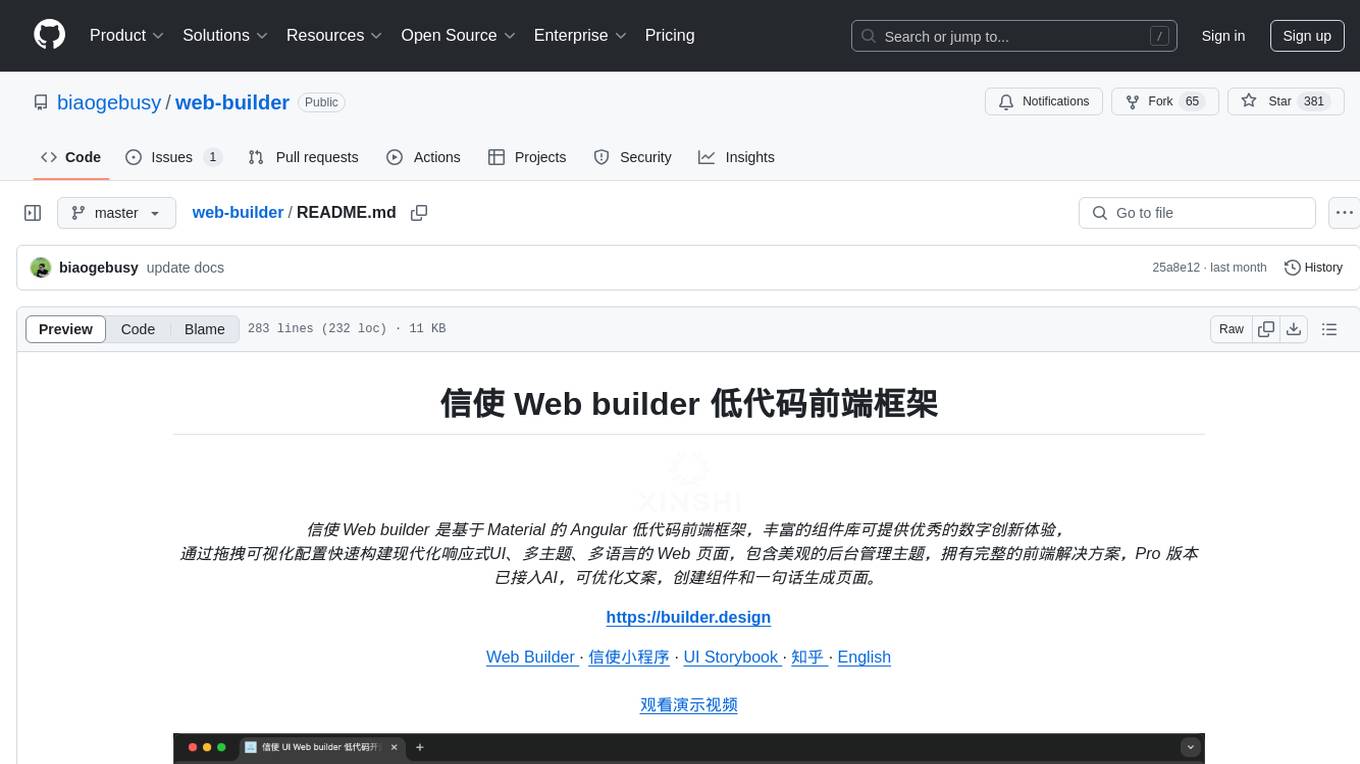
web-builder
Web Builder is a low-code front-end framework based on Material for Angular, offering a rich component library for excellent digital innovation experience. It allows rapid construction of modern responsive UI, multi-theme, multi-language web pages through drag-and-drop visual configuration. The framework includes a beautiful admin theme, complete front-end solutions, and AI integration in the Pro version for optimizing copy, creating components, and generating pages with a single sentence.
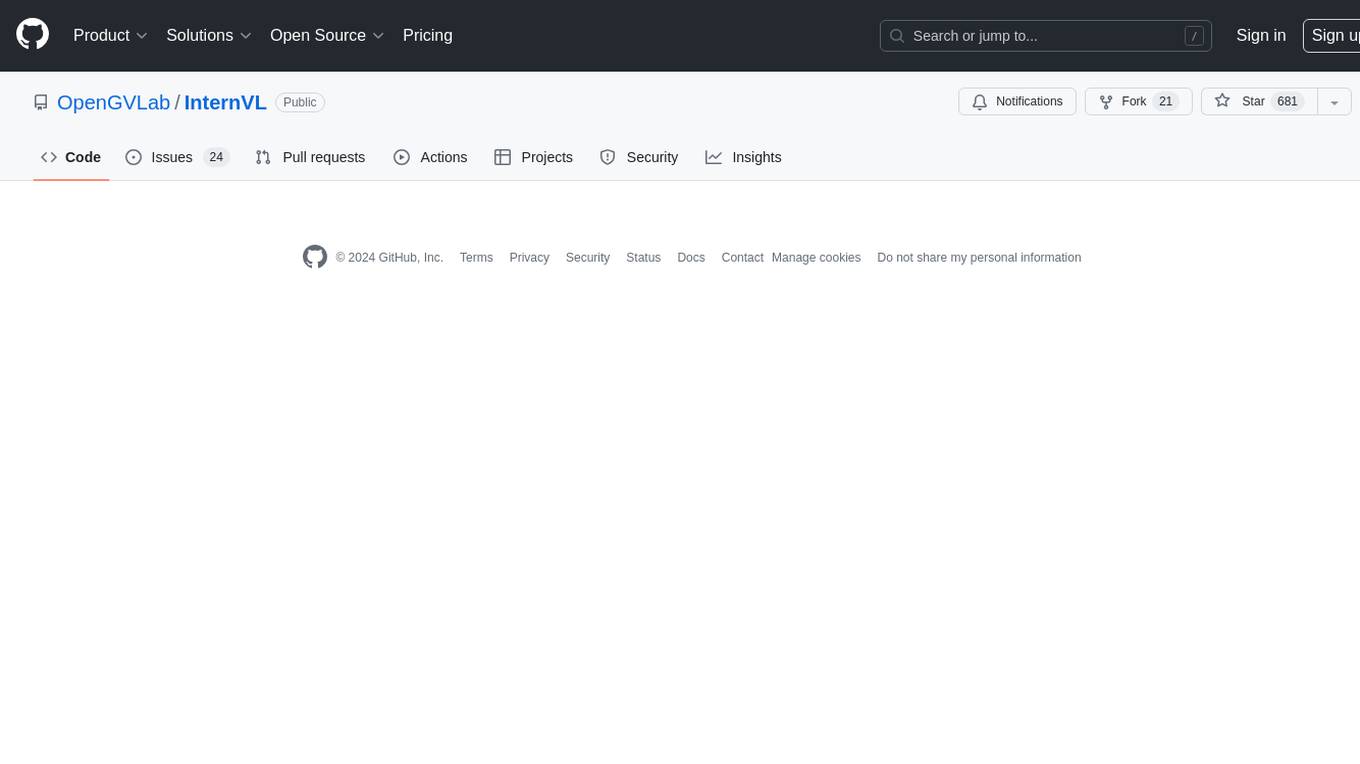
InternVL
InternVL scales up the ViT to _**6B parameters**_ and aligns it with LLM. It is a vision-language foundation model that can perform various tasks, including: **Visual Perception** - Linear-Probe Image Classification - Semantic Segmentation - Zero-Shot Image Classification - Multilingual Zero-Shot Image Classification - Zero-Shot Video Classification **Cross-Modal Retrieval** - English Zero-Shot Image-Text Retrieval - Chinese Zero-Shot Image-Text Retrieval - Multilingual Zero-Shot Image-Text Retrieval on XTD **Multimodal Dialogue** - Zero-Shot Image Captioning - Multimodal Benchmarks with Frozen LLM - Multimodal Benchmarks with Trainable LLM - Tiny LVLM InternVL has been shown to achieve state-of-the-art results on a variety of benchmarks. For example, on the MMMU image classification benchmark, InternVL achieves a top-1 accuracy of 51.6%, which is higher than GPT-4V and Gemini Pro. On the DocVQA question answering benchmark, InternVL achieves a score of 82.2%, which is also higher than GPT-4V and Gemini Pro. InternVL is open-sourced and available on Hugging Face. It can be used for a variety of applications, including image classification, object detection, semantic segmentation, image captioning, and question answering.
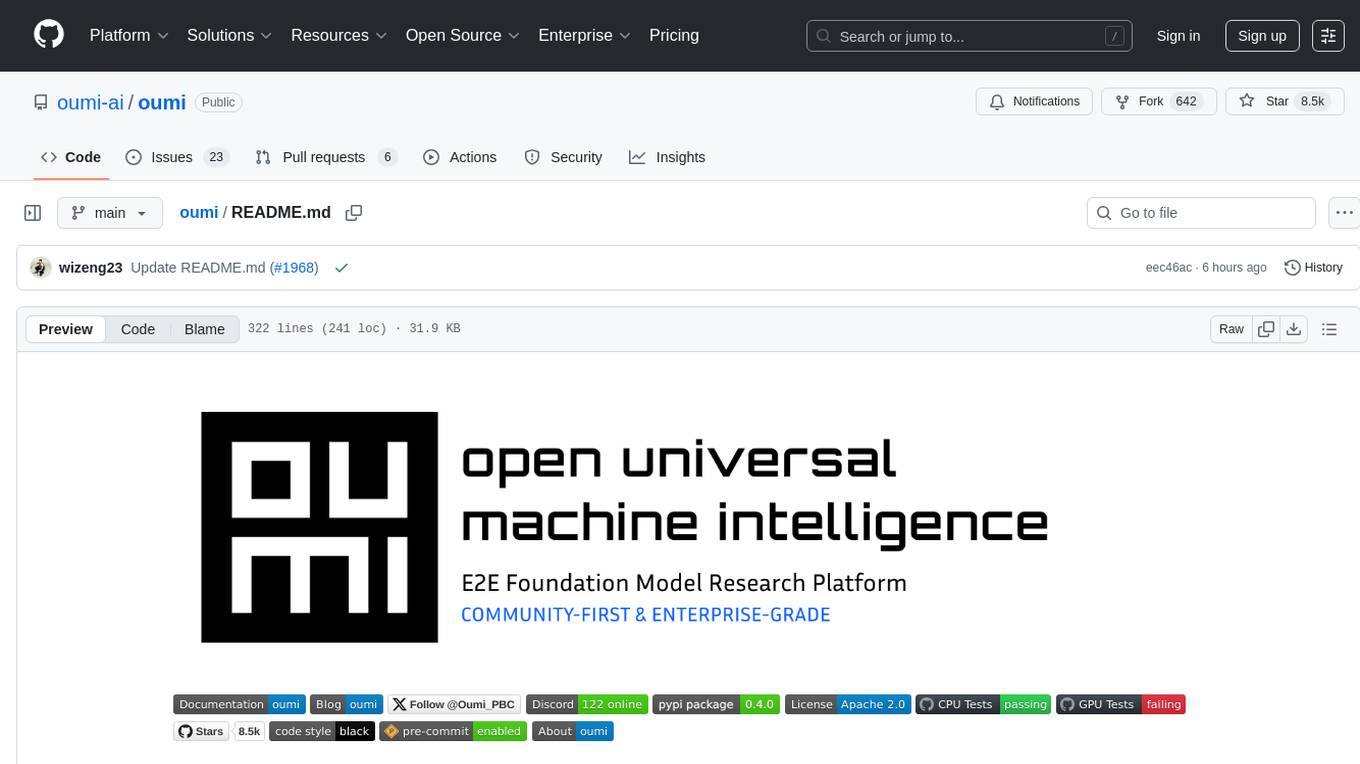
oumi
Oumi is an open-source platform for building state-of-the-art foundation models, offering tools for data preparation, training, evaluation, and deployment. It supports training and fine-tuning models with various parameters, working with text and multimodal models, synthesizing and curating training data, deploying models efficiently, evaluating models comprehensively, and running on different platforms. Oumi provides a consistent API, reliability, and flexibility for research purposes.
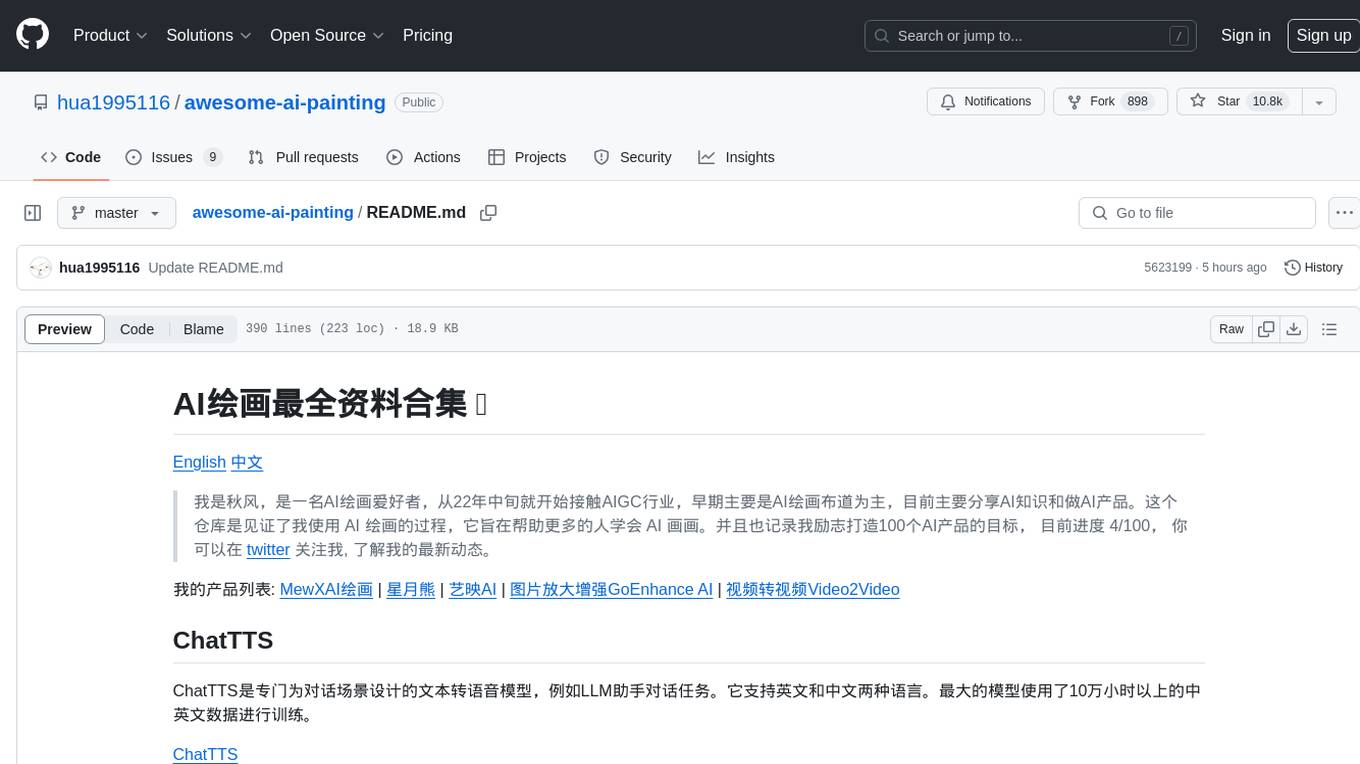
awesome-ai-painting
This repository, named 'awesome-ai-painting', is a comprehensive collection of resources related to AI painting. It is curated by a user named 秋风, who is an AI painting enthusiast with a background in the AIGC industry. The repository aims to help more people learn AI painting and also documents the user's goal of creating 100 AI products, with current progress at 4/100. The repository includes information on various AI painting products, tutorials, tools, and models, providing a valuable resource for individuals interested in AI painting and related technologies.
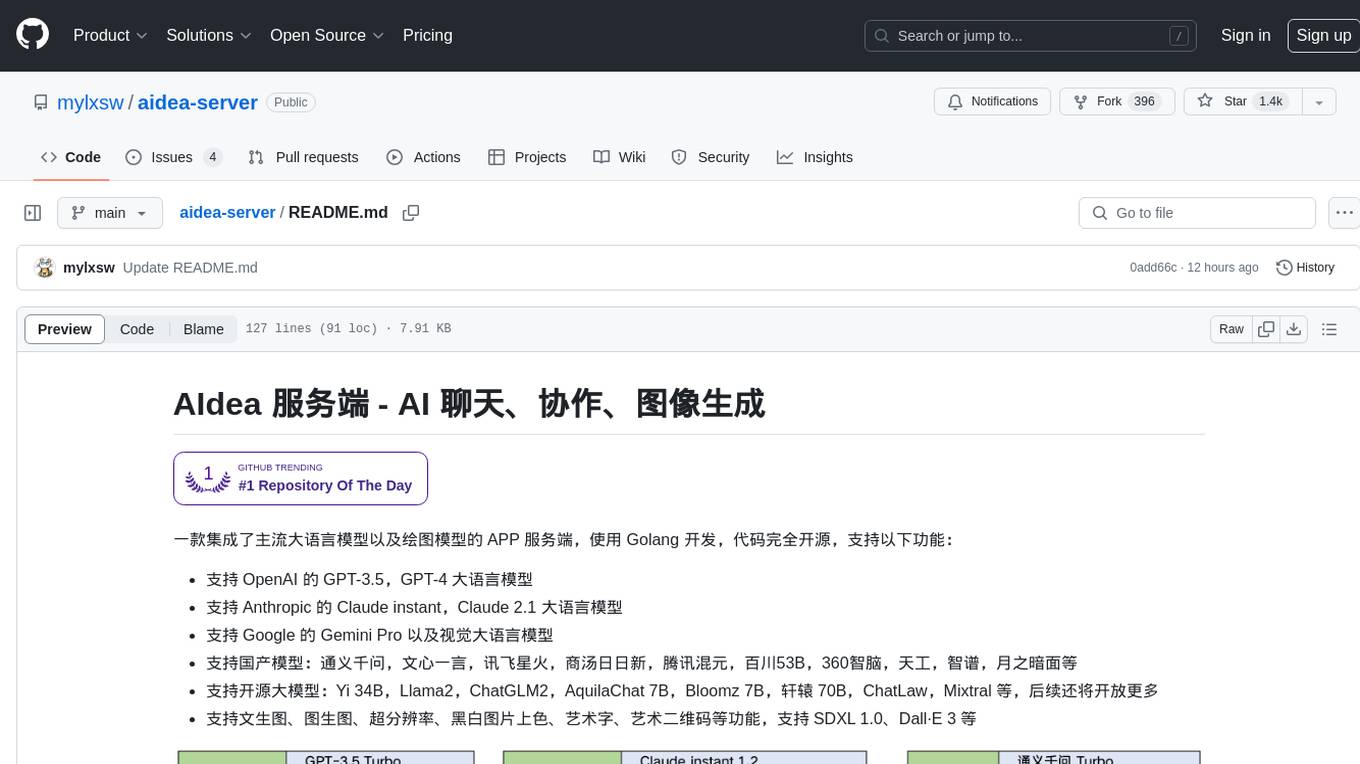
aidea-server
AIdea Server is an open-source Golang-based server that integrates mainstream large language models and drawing models. It supports various functionalities including OpenAI's GPT-3.5 and GPT-4, Anthropic's Claude instant and Claude 2.1, Google's Gemini Pro, as well as Chinese models like Tongyi Qianwen, Wenxin Yiyuan, and more. It also supports open-source large models like Yi 34B, Llama2, and AquilaChat 7B. Additionally, it provides features for text-to-image, super-resolution, coloring black and white images, generating art fonts and QR codes, among others.
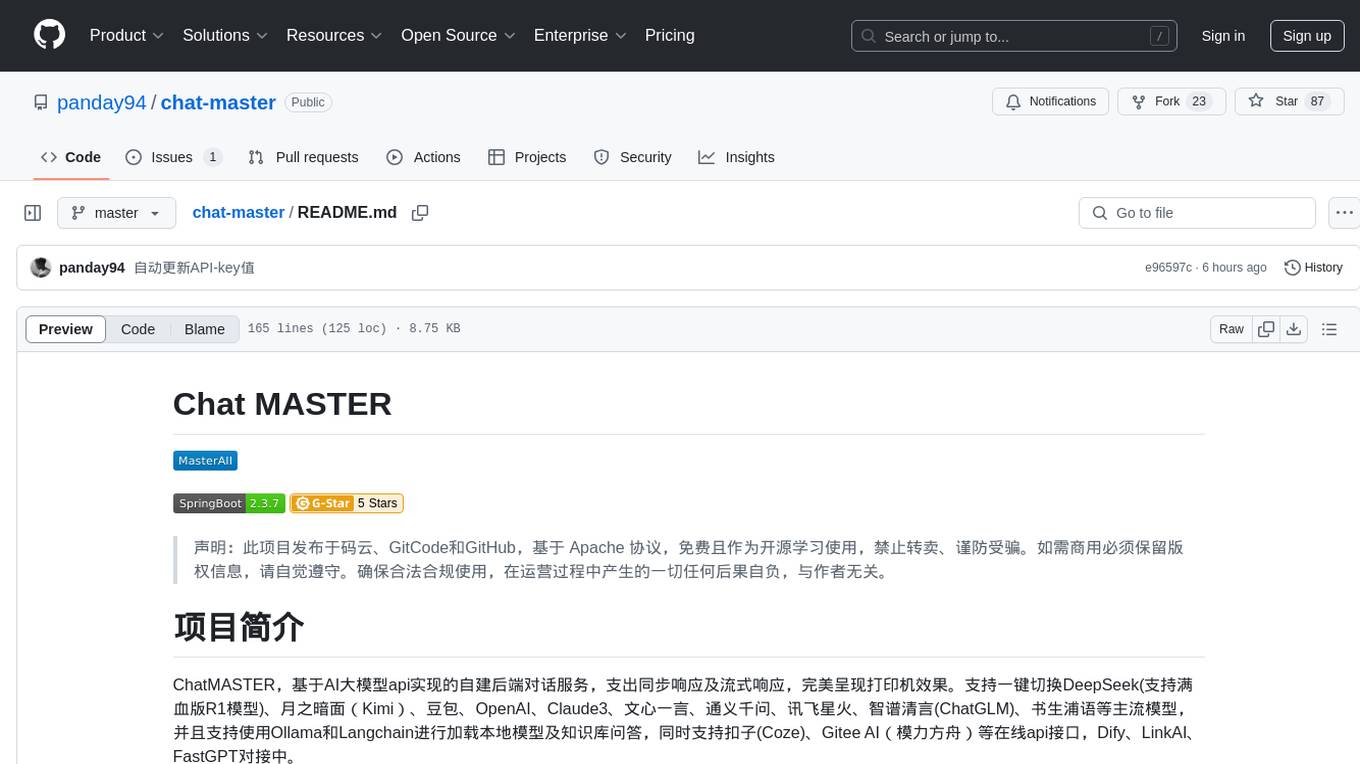
chat-master
ChatMASTER is a self-built backend conversation service based on AI large model APIs, supporting synchronous and streaming responses with perfect printer effects. It supports switching between mainstream models such as DeepSeek, Kimi, Doubao, OpenAI, Claude3, Yiyan, Tongyi, Xinghuo, ChatGLM, Shusheng, and more. It also supports loading local models and knowledge bases using Ollama and Langchain, as well as online API interfaces like Coze and Gitee AI. The project includes Java server-side, web-side, mobile-side, and management background configuration. It provides various assistant types for prompt output and allows creating custom assistant templates in the management background. The project uses technologies like Spring Boot, Spring Security + JWT, Mybatis-Plus, Lombok, Mysql & Redis, with easy-to-understand code and comprehensive permission control using JWT authentication system for multi-terminal support.

AiTreasureBox
AiTreasureBox is a versatile AI tool that provides a collection of pre-trained models and algorithms for various machine learning tasks. It simplifies the process of implementing AI solutions by offering ready-to-use components that can be easily integrated into projects. With AiTreasureBox, users can quickly prototype and deploy AI applications without the need for extensive knowledge in machine learning or deep learning. The tool covers a wide range of tasks such as image classification, text generation, sentiment analysis, object detection, and more. It is designed to be user-friendly and accessible to both beginners and experienced developers, making AI development more efficient and accessible to a wider audience.
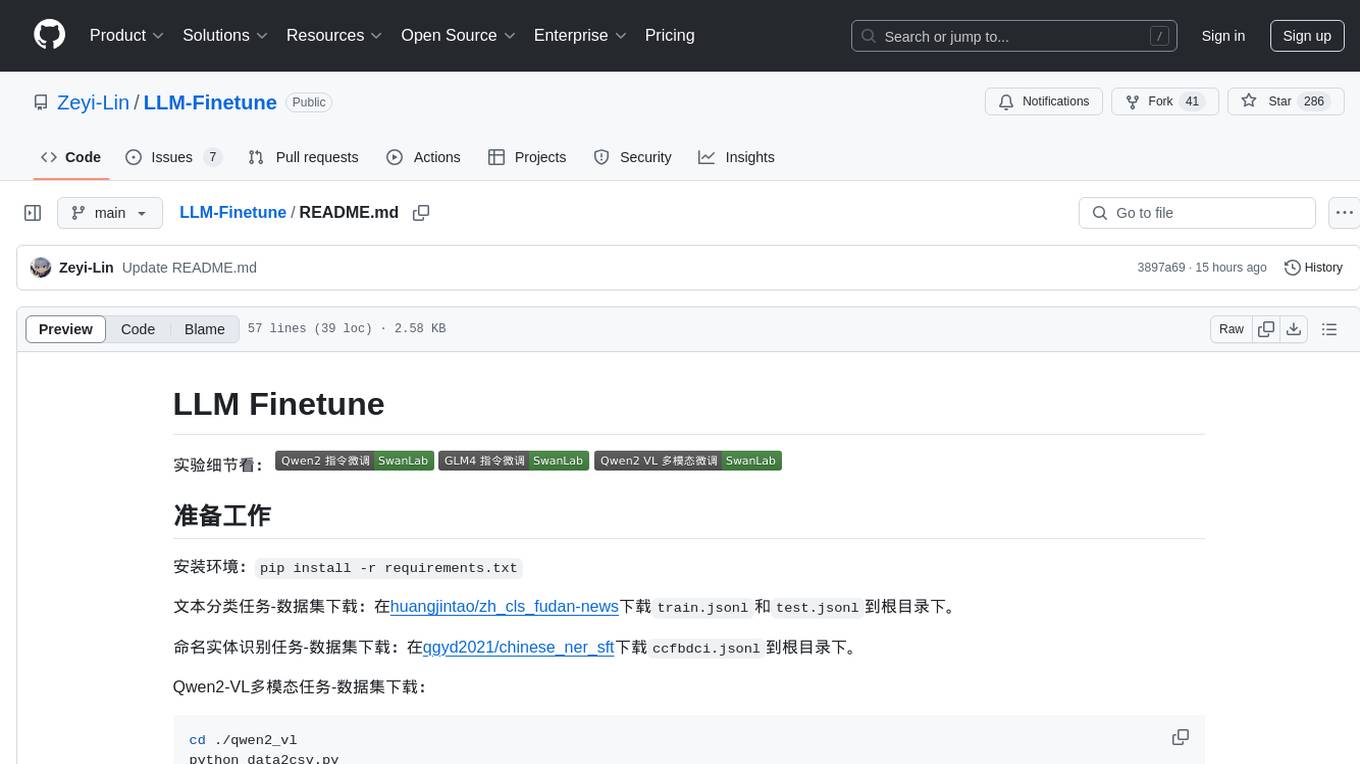
LLM-Finetune
LLM-Finetune is a repository for fine-tuning language models for various NLP tasks such as text classification and named entity recognition. It provides instructions and scripts for training and inference using models like Qwen2-VL and GLM4. The repository also includes datasets for tasks like text classification, named entity recognition, and multimodal tasks. Users can easily prepare the environment, download datasets, train models, and perform inference using the provided scripts and notebooks. Additionally, the repository references SwanLab, an AI training record, analysis, and visualization tool.
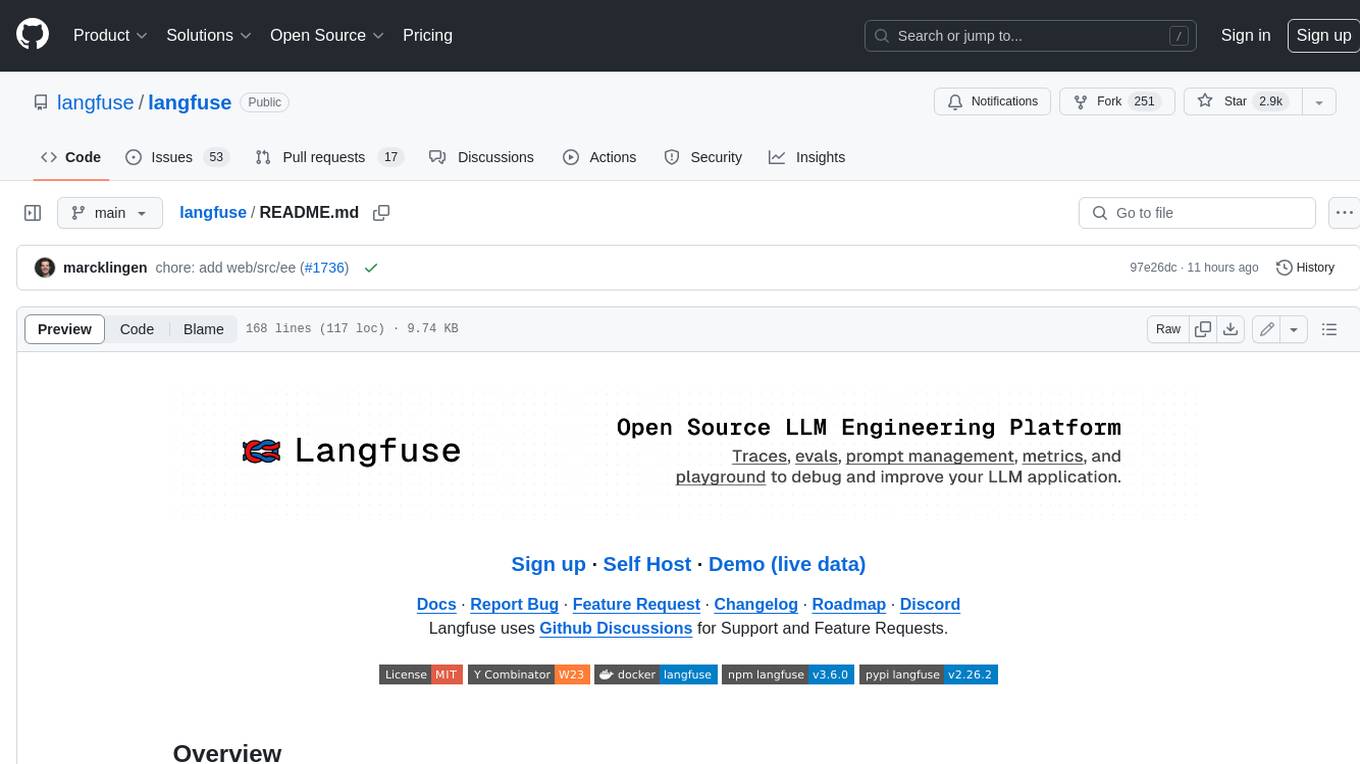
langfuse
Langfuse is a powerful tool that helps you develop, monitor, and test your LLM applications. With Langfuse, you can: * **Develop:** Instrument your app and start ingesting traces to Langfuse, inspect and debug complex logs, and manage, version, and deploy prompts from within Langfuse. * **Monitor:** Track metrics (cost, latency, quality) and gain insights from dashboards & data exports, collect and calculate scores for your LLM completions, run model-based evaluations, collect user feedback, and manually score observations in Langfuse. * **Test:** Track and test app behaviour before deploying a new version, test expected in and output pairs and benchmark performance before deploying, and track versions and releases in your application. Langfuse is easy to get started with and offers a generous free tier. You can sign up for Langfuse Cloud or deploy Langfuse locally or on your own infrastructure. Langfuse also offers a variety of integrations to make it easy to connect to your LLM applications.
For similar tasks

LLMStack
LLMStack is a no-code platform for building generative AI agents, workflows, and chatbots. It allows users to connect their own data, internal tools, and GPT-powered models without any coding experience. LLMStack can be deployed to the cloud or on-premise and can be accessed via HTTP API or triggered from Slack or Discord.

ai-guide
This guide is dedicated to Large Language Models (LLMs) that you can run on your home computer. It assumes your PC is a lower-end, non-gaming setup.

onnxruntime-genai
ONNX Runtime Generative AI is a library that provides the generative AI loop for ONNX models, including inference with ONNX Runtime, logits processing, search and sampling, and KV cache management. Users can call a high level `generate()` method, or run each iteration of the model in a loop. It supports greedy/beam search and TopP, TopK sampling to generate token sequences, has built in logits processing like repetition penalties, and allows for easy custom scoring.

jupyter-ai
Jupyter AI connects generative AI with Jupyter notebooks. It provides a user-friendly and powerful way to explore generative AI models in notebooks and improve your productivity in JupyterLab and the Jupyter Notebook. Specifically, Jupyter AI offers: * An `%%ai` magic that turns the Jupyter notebook into a reproducible generative AI playground. This works anywhere the IPython kernel runs (JupyterLab, Jupyter Notebook, Google Colab, Kaggle, VSCode, etc.). * A native chat UI in JupyterLab that enables you to work with generative AI as a conversational assistant. * Support for a wide range of generative model providers, including AI21, Anthropic, AWS, Cohere, Gemini, Hugging Face, NVIDIA, and OpenAI. * Local model support through GPT4All, enabling use of generative AI models on consumer grade machines with ease and privacy.

khoj
Khoj is an open-source, personal AI assistant that extends your capabilities by creating always-available AI agents. You can share your notes and documents to extend your digital brain, and your AI agents have access to the internet, allowing you to incorporate real-time information. Khoj is accessible on Desktop, Emacs, Obsidian, Web, and Whatsapp, and you can share PDF, markdown, org-mode, notion files, and GitHub repositories. You'll get fast, accurate semantic search on top of your docs, and your agents can create deeply personal images and understand your speech. Khoj is self-hostable and always will be.

langchain_dart
LangChain.dart is a Dart port of the popular LangChain Python framework created by Harrison Chase. LangChain provides a set of ready-to-use components for working with language models and a standard interface for chaining them together to formulate more advanced use cases (e.g. chatbots, Q&A with RAG, agents, summarization, extraction, etc.). The components can be grouped into a few core modules: * **Model I/O:** LangChain offers a unified API for interacting with various LLM providers (e.g. OpenAI, Google, Mistral, Ollama, etc.), allowing developers to switch between them with ease. Additionally, it provides tools for managing model inputs (prompt templates and example selectors) and parsing the resulting model outputs (output parsers). * **Retrieval:** assists in loading user data (via document loaders), transforming it (with text splitters), extracting its meaning (using embedding models), storing (in vector stores) and retrieving it (through retrievers) so that it can be used to ground the model's responses (i.e. Retrieval-Augmented Generation or RAG). * **Agents:** "bots" that leverage LLMs to make informed decisions about which available tools (such as web search, calculators, database lookup, etc.) to use to accomplish the designated task. The different components can be composed together using the LangChain Expression Language (LCEL).

danswer
Danswer is an open-source Gen-AI Chat and Unified Search tool that connects to your company's docs, apps, and people. It provides a Chat interface and plugs into any LLM of your choice. Danswer can be deployed anywhere and for any scale - on a laptop, on-premise, or to cloud. Since you own the deployment, your user data and chats are fully in your own control. Danswer is MIT licensed and designed to be modular and easily extensible. The system also comes fully ready for production usage with user authentication, role management (admin/basic users), chat persistence, and a UI for configuring Personas (AI Assistants) and their Prompts. Danswer also serves as a Unified Search across all common workplace tools such as Slack, Google Drive, Confluence, etc. By combining LLMs and team specific knowledge, Danswer becomes a subject matter expert for the team. Imagine ChatGPT if it had access to your team's unique knowledge! It enables questions such as "A customer wants feature X, is this already supported?" or "Where's the pull request for feature Y?"

infinity
Infinity is an AI-native database designed for LLM applications, providing incredibly fast full-text and vector search capabilities. It supports a wide range of data types, including vectors, full-text, and structured data, and offers a fused search feature that combines multiple embeddings and full text. Infinity is easy to use, with an intuitive Python API and a single-binary architecture that simplifies deployment. It achieves high performance, with 0.1 milliseconds query latency on million-scale vector datasets and up to 15K QPS.
For similar jobs

h2ogpt
h2oGPT is an Apache V2 open-source project that allows users to query and summarize documents or chat with local private GPT LLMs. It features a private offline database of any documents (PDFs, Excel, Word, Images, Video Frames, Youtube, Audio, Code, Text, MarkDown, etc.), a persistent database (Chroma, Weaviate, or in-memory FAISS) using accurate embeddings (instructor-large, all-MiniLM-L6-v2, etc.), and efficient use of context using instruct-tuned LLMs (no need for LangChain's few-shot approach). h2oGPT also offers parallel summarization and extraction, reaching an output of 80 tokens per second with the 13B LLaMa2 model, HYDE (Hypothetical Document Embeddings) for enhanced retrieval based upon LLM responses, a variety of models supported (LLaMa2, Mistral, Falcon, Vicuna, WizardLM. With AutoGPTQ, 4-bit/8-bit, LORA, etc.), GPU support from HF and LLaMa.cpp GGML models, and CPU support using HF, LLaMa.cpp, and GPT4ALL models. Additionally, h2oGPT provides Attention Sinks for arbitrarily long generation (LLaMa-2, Mistral, MPT, Pythia, Falcon, etc.), a UI or CLI with streaming of all models, the ability to upload and view documents through the UI (control multiple collaborative or personal collections), Vision Models LLaVa, Claude-3, Gemini-Pro-Vision, GPT-4-Vision, Image Generation Stable Diffusion (sdxl-turbo, sdxl) and PlaygroundAI (playv2), Voice STT using Whisper with streaming audio conversion, Voice TTS using MIT-Licensed Microsoft Speech T5 with multiple voices and Streaming audio conversion, Voice TTS using MPL2-Licensed TTS including Voice Cloning and Streaming audio conversion, AI Assistant Voice Control Mode for hands-free control of h2oGPT chat, Bake-off UI mode against many models at the same time, Easy Download of model artifacts and control over models like LLaMa.cpp through the UI, Authentication in the UI by user/password via Native or Google OAuth, State Preservation in the UI by user/password, Linux, Docker, macOS, and Windows support, Easy Windows Installer for Windows 10 64-bit (CPU/CUDA), Easy macOS Installer for macOS (CPU/M1/M2), Inference Servers support (oLLaMa, HF TGI server, vLLM, Gradio, ExLLaMa, Replicate, OpenAI, Azure OpenAI, Anthropic), OpenAI-compliant, Server Proxy API (h2oGPT acts as drop-in-replacement to OpenAI server), Python client API (to talk to Gradio server), JSON Mode with any model via code block extraction. Also supports MistralAI JSON mode, Claude-3 via function calling with strict Schema, OpenAI via JSON mode, and vLLM via guided_json with strict Schema, Web-Search integration with Chat and Document Q/A, Agents for Search, Document Q/A, Python Code, CSV frames (Experimental, best with OpenAI currently), Evaluate performance using reward models, and Quality maintained with over 1000 unit and integration tests taking over 4 GPU-hours.

mistral.rs
Mistral.rs is a fast LLM inference platform written in Rust. We support inference on a variety of devices, quantization, and easy-to-use application with an Open-AI API compatible HTTP server and Python bindings.
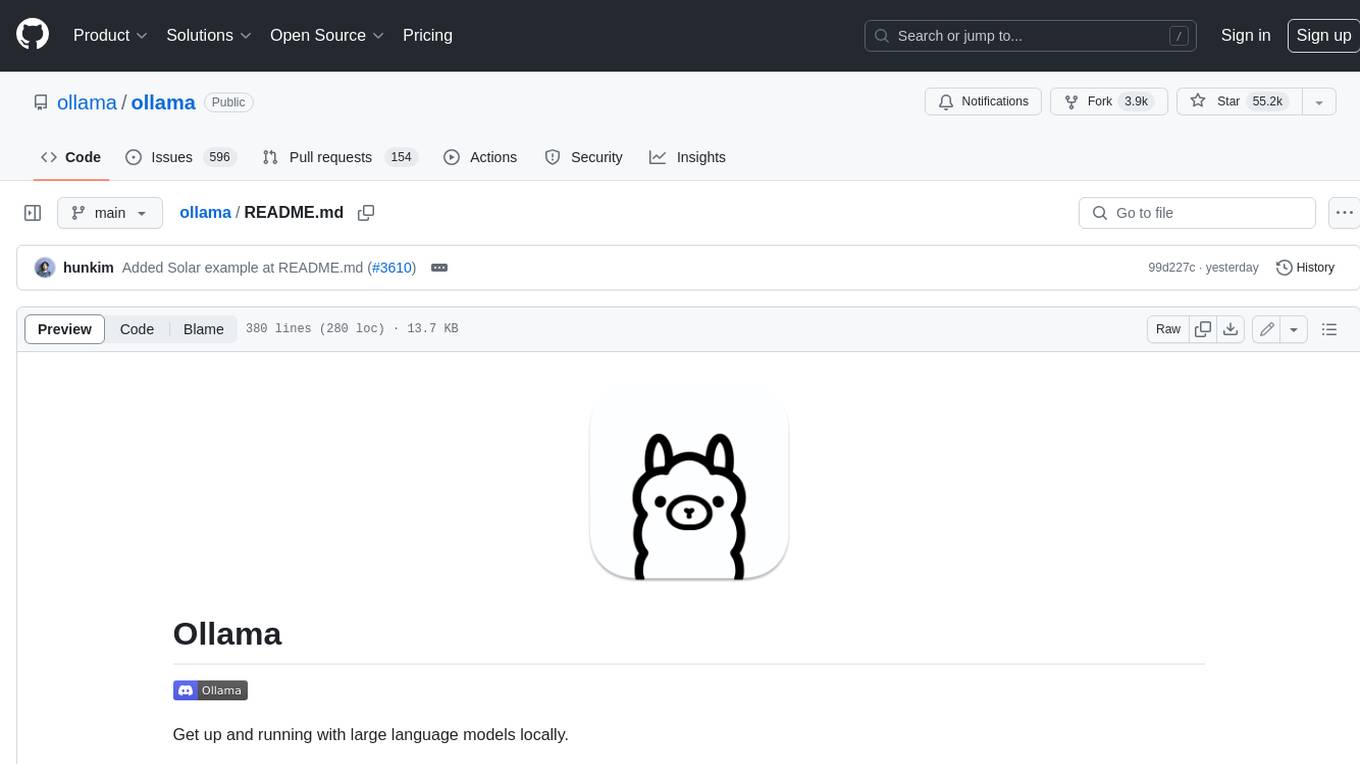
ollama
Ollama is a lightweight, extensible framework for building and running language models on the local machine. It provides a simple API for creating, running, and managing models, as well as a library of pre-built models that can be easily used in a variety of applications. Ollama is designed to be easy to use and accessible to developers of all levels. It is open source and available for free on GitHub.
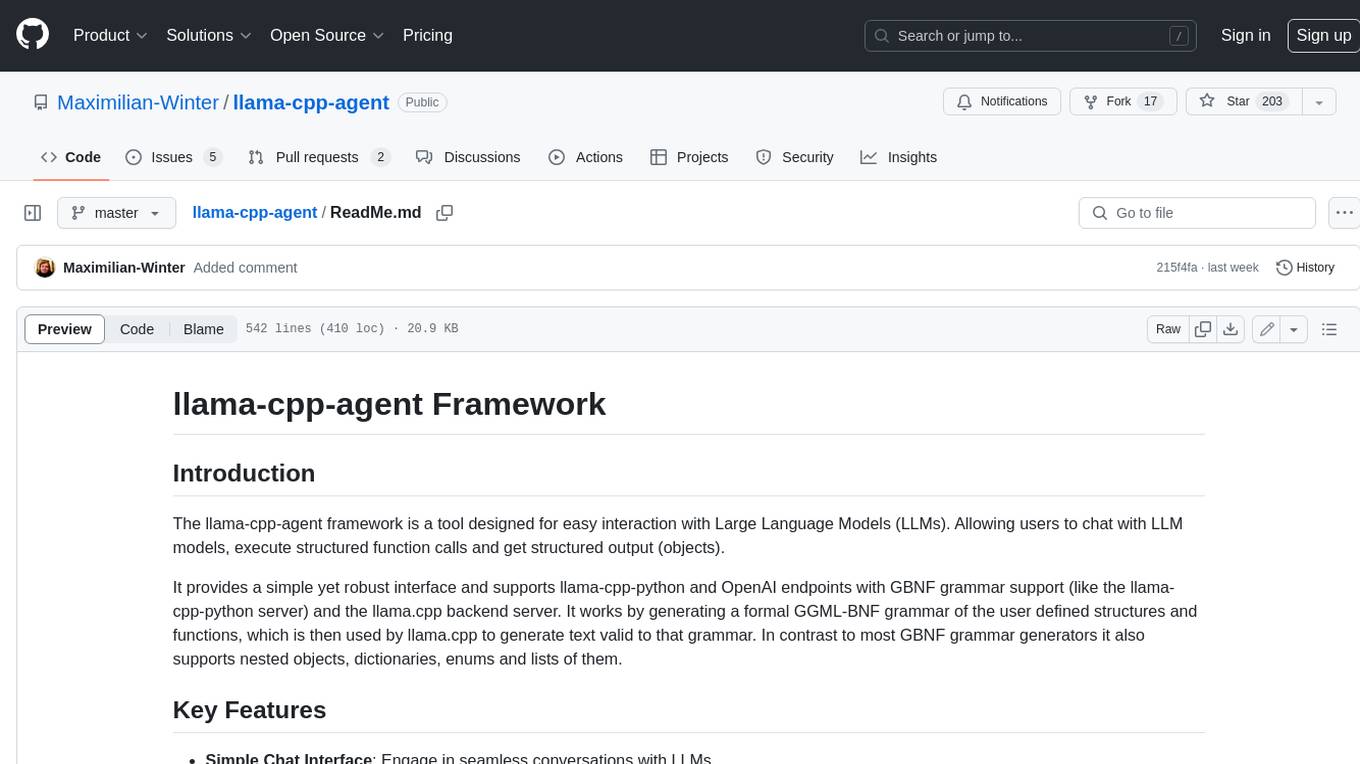
llama-cpp-agent
The llama-cpp-agent framework is a tool designed for easy interaction with Large Language Models (LLMs). Allowing users to chat with LLM models, execute structured function calls and get structured output (objects). It provides a simple yet robust interface and supports llama-cpp-python and OpenAI endpoints with GBNF grammar support (like the llama-cpp-python server) and the llama.cpp backend server. It works by generating a formal GGML-BNF grammar of the user defined structures and functions, which is then used by llama.cpp to generate text valid to that grammar. In contrast to most GBNF grammar generators it also supports nested objects, dictionaries, enums and lists of them.
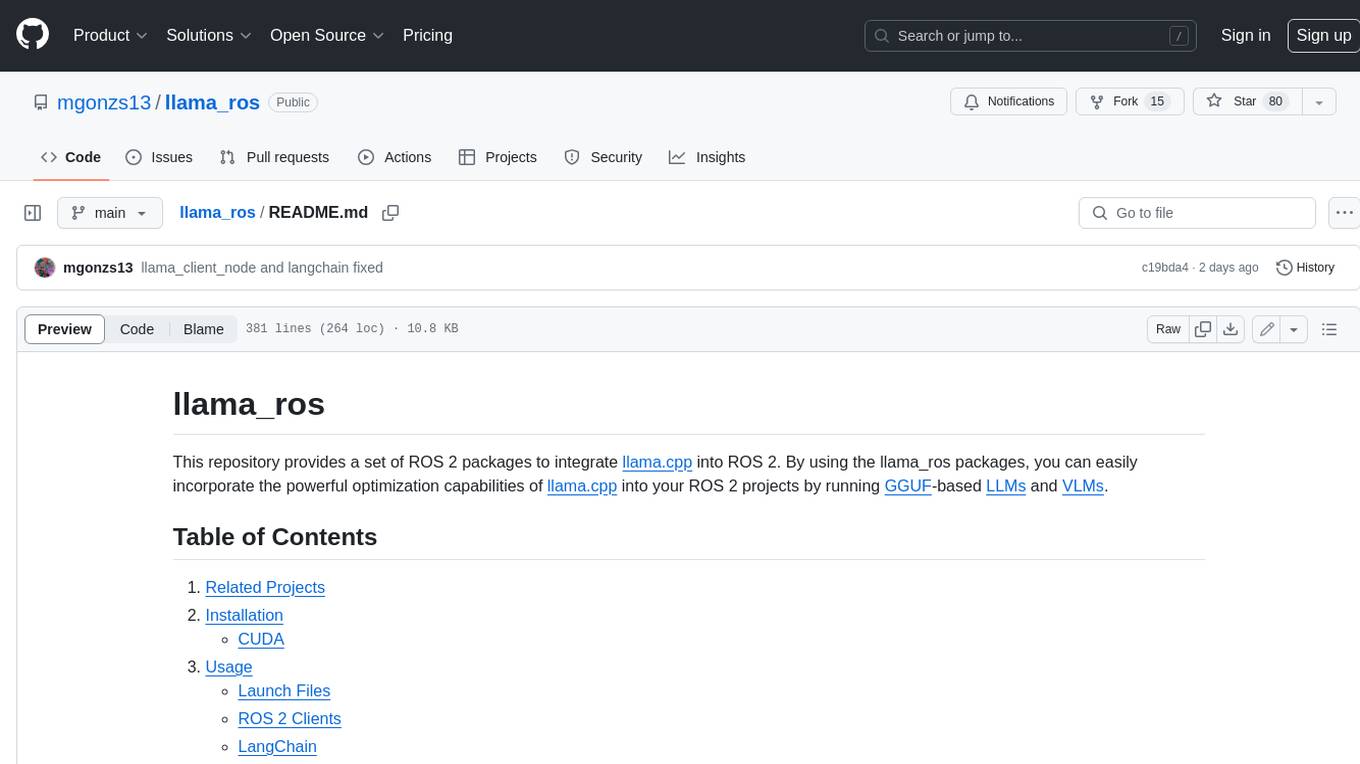
llama_ros
This repository provides a set of ROS 2 packages to integrate llama.cpp into ROS 2. By using the llama_ros packages, you can easily incorporate the powerful optimization capabilities of llama.cpp into your ROS 2 projects by running GGUF-based LLMs and VLMs.
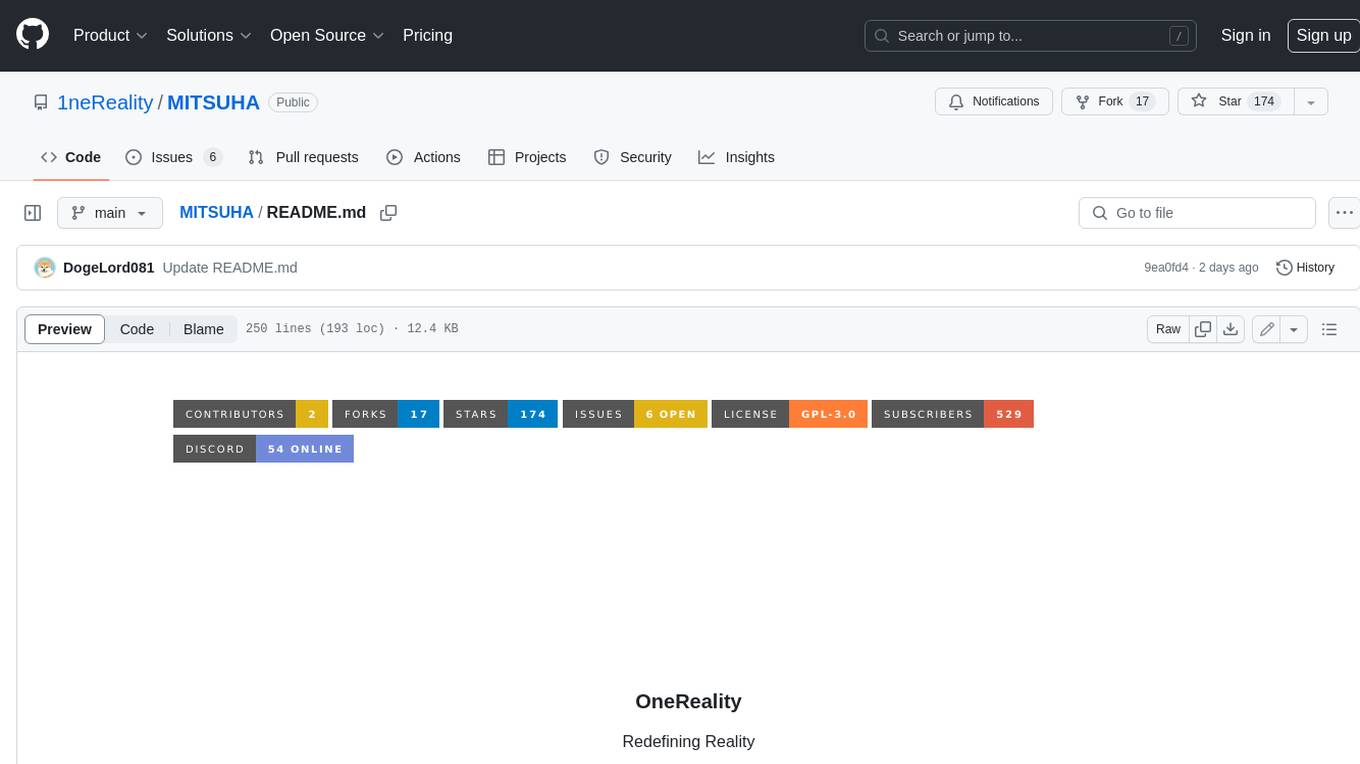
MITSUHA
OneReality is a virtual waifu/assistant that you can speak to through your mic and it'll speak back to you! It has many features such as: * You can speak to her with a mic * It can speak back to you * Has short-term memory and long-term memory * Can open apps * Smarter than you * Fluent in English, Japanese, Korean, and Chinese * Can control your smart home like Alexa if you set up Tuya (more info in Prerequisites) It is built with Python, Llama-cpp-python, Whisper, SpeechRecognition, PocketSphinx, VITS-fast-fine-tuning, VITS-simple-api, HyperDB, Sentence Transformers, and Tuya Cloud IoT.
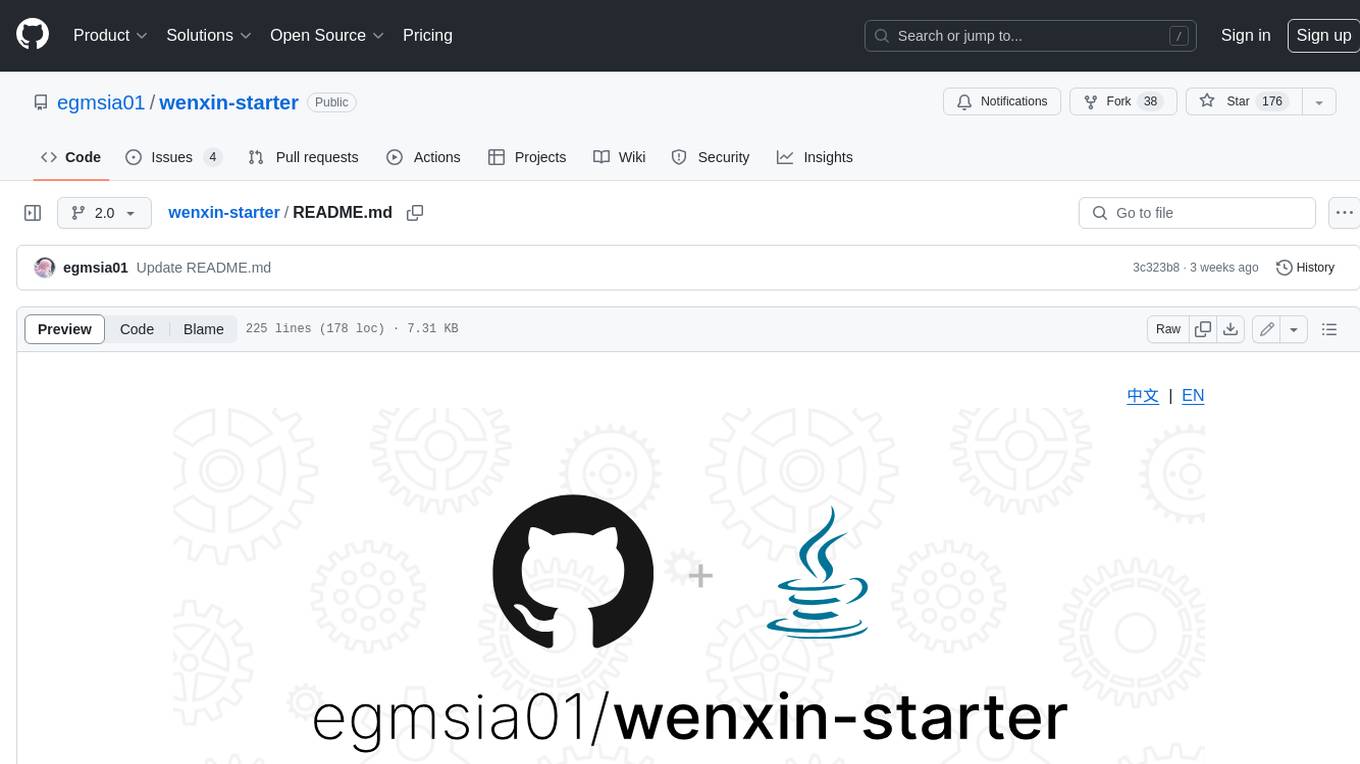
wenxin-starter
WenXin-Starter is a spring-boot-starter for Baidu's "Wenxin Qianfan WENXINWORKSHOP" large model, which can help you quickly access Baidu's AI capabilities. It fully integrates the official API documentation of Wenxin Qianfan. Supports text-to-image generation, built-in dialogue memory, and supports streaming return of dialogue. Supports QPS control of a single model and supports queuing mechanism. Plugins will be added soon.
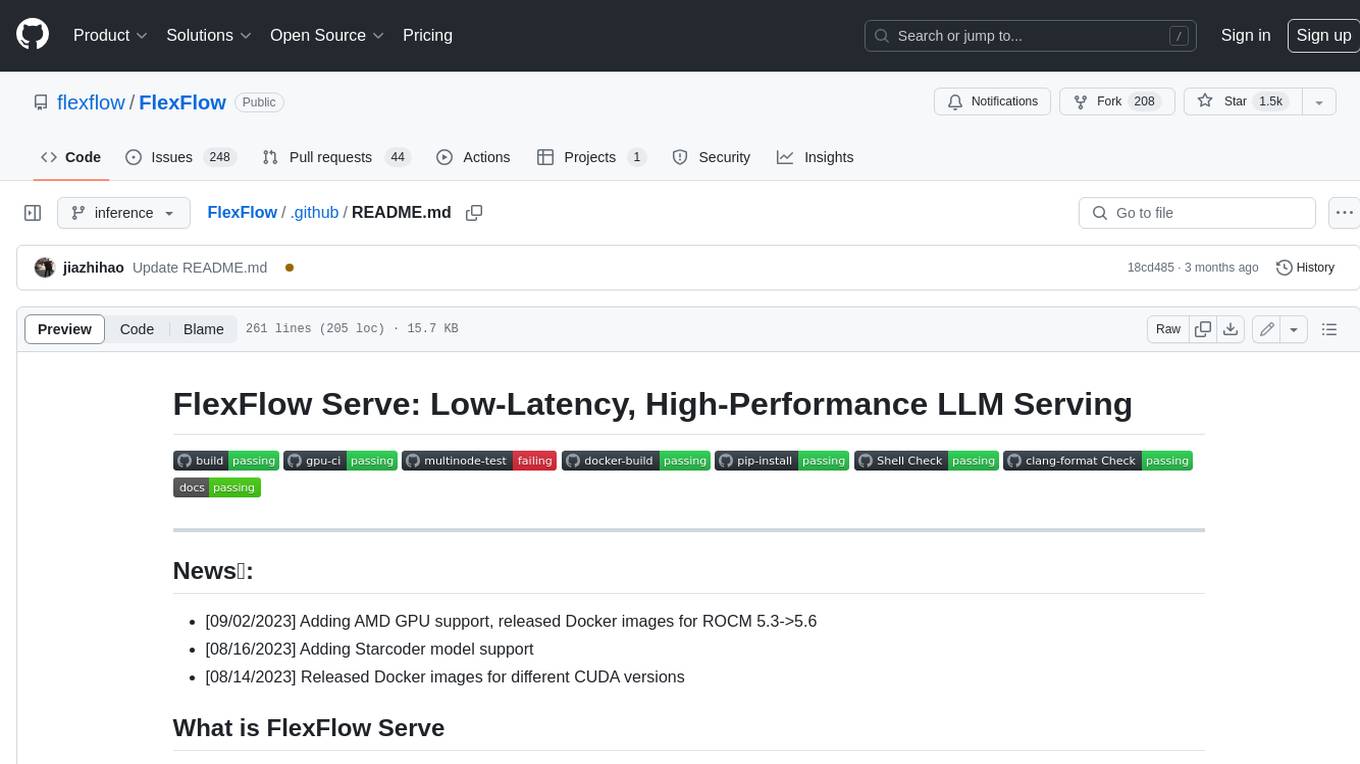
FlexFlow
FlexFlow Serve is an open-source compiler and distributed system for **low latency**, **high performance** LLM serving. FlexFlow Serve outperforms existing systems by 1.3-2.0x for single-node, multi-GPU inference and by 1.4-2.4x for multi-node, multi-GPU inference.










